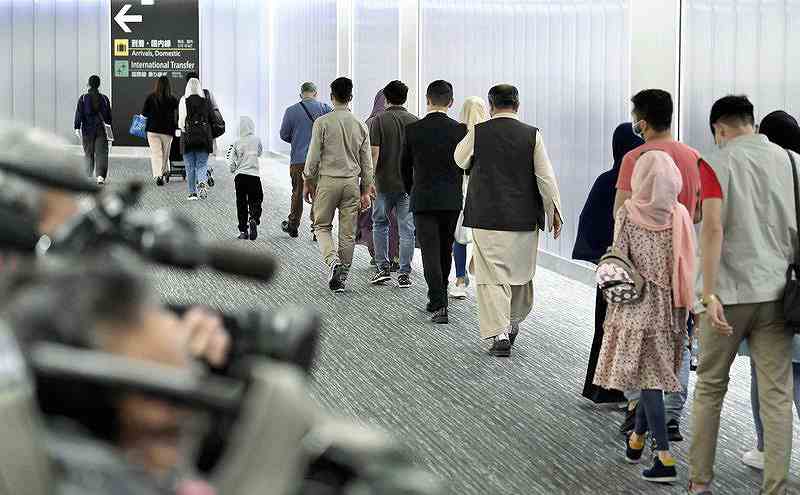
Afghans including local staff of the Japanese Embassy in Afghanistan arrive at Narita Airport on Oct. 19.
November 7, 2021
The government has made some progress in helping Afghans who wish to flee to Japan, after forging cooperation with the Qatari government, which has links with the Taliban, the Islamist group that has seized power in Afghanistan.
So far, more than 300 Afghans, mainly local staff of the Japanese Embassy in Afghanistan and the Japan International Cooperation Agency (JICA), have arrived in Japan. This means that more than half of about 500 Afghans who want to evacuate to Japan have realized their wishes.
In August, the Japanese government dispatched Self-Defense Forces aircraft to Afghanistan. But due to the rapidly deteriorated security situation, the SDF could evacuate only a Japanese national and some Afghans that the United States asked Japan to help. Leaving behind Afghan staff and their families prompted criticism from Japan’s ruling and opposition parties.
Concluding that it would be difficult for Japan to dispatch SDF planes to Afghanistan for the time being, the government requested cooperation from the Qatari government.
In early September, the government’s representative, Tsukasa Uemura, visited Doha to negotiate with the Taliban and the Qatari government.
On Sept. 23, then Foreign Minister Toshimitsu Motegi met with his Qatari counterpart Sheikh Mohammed bin Abdulrahman Al Thani in New York to ask for cooperation. In response to this, the Qatari foreign minister said the country would extend its utmost cooperation, according to Japan’s Foreign Ministry.
The results of the negotiations became evident in October, when the Qatari government dispatched a chartered plane to Afghanistan, and 53 people, including Afghan employees of the Japanese Embassy, escaped to Doha. They arrived in Japan on Oct. 8 on a commercial flight from Doha. In addition to the flight, the Qatari government arranged for ground transportation to the airport. A total of 331 people have arrived in Japan so far.
The next challenge to work out is ensuring their livelihoods, such as by providing them employment. The Afghans are allowed to stay in Japan for 90 days after entering the country, and during this period, they need to choose whether to remain here or depart for a third country.
For the time being, the government and JICA plan to have the local staff remain as their employees and be paid salaries. But if they wish to remain in Japan, the government and JICA will need to consider such issues as how long to keep them employed and whether to introduce them to other jobs.
Top Articles in World
-

Israeli Ambassador to Japan Speaks about Japan’s Role in the Reconstruction of Gaza
-

Videos Plagiarized, Reposted with False Subtitles Claiming ‘Ryukyu Belongs to China’; Anti-China False Information Also Posted in Japan
-

North Korea Possibly Launches Ballistic Missile
-

Chinese Embassy in Japan Reiterates Call for Chinese People to Refrain from Traveling to Japan; Call Comes in Wake of ¥400 Mil. Robbery
-

Russia: Visa Required for Visiting Graves in Northern Territories, Lifting of Sanctions Also Necessary
JN ACCESS RANKING
-

Japan PM Takaichi’s Cabinet Resigns en Masse
-

Japan Institute to Use Domestic Commercial Optical Lattice Clock to Set Japan Standard Time
-

Israeli Ambassador to Japan Speaks about Japan’s Role in the Reconstruction of Gaza
-

Man Infected with Measles Reportedly Dined at Restaurant in Tokyo Station
-

Videos Plagiarized, Reposted with False Subtitles Claiming ‘Ryukyu Belongs to China’; Anti-China False Information Also Posted in Japan






















